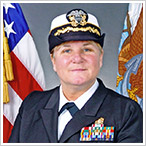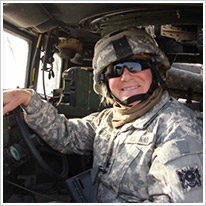Gina Harden (Part 1)
Navy Dive and Salvage Officer—Kindness On and Off the Battlefield
By Marjorie F. Eddington
Categories: Diplomat, Fear, Jesus' Commandment - To Love as He Loved, Military, Power of Prayer Gina Harden currently serves her country in the Joint Operating Center at U.S. Central Command. But she started off as the seventh female U.S. Navy diver in 1982 (which we will highlight in a later interview). In 2009, Harden was awarded the Bronze Star for “Meritorious Service” for her role as Officer In Charge of U.S. Naval Forces Central Command Forward Headquarters in Afghanistan. She talks about this experience and how diplomacy, kindness, and faith are critical in working through difficult issues or fearful situations.
 Tell us about your work in Afghanistan. Tell us about your work in Afghanistan.
At the time, I was recalled to active duty from the Reserves and got mobilized for a year. I went to Afghanistan and was in charge of over 2,000 Navy Sailors in the combat zone who were supporting the Army in 2009-10. Often, because the Army wasn’t properly sourced, the Army would put the Sailors in jobs they weren’t trained to do. For instance, one of the kids was a legal aid, but they made him the General's personal security driver. Well, he had no training in providing security to the General as his driver. So I was constantly arguing with the Army, trying to keep my Sailors safe. I prayed a lot.
I flew about 10,000 miles all over Afghanistan, taking care of Sailors and talking to their commanding officers, remaining calm while I spoke to leadership, offering solutions like getting the person proper training or getting someone else who could do the job. It was a delicate balance in diplomacy. That was probably one of the most challenging jobs I had in the Navy.
And now?
Currently, I’m on active duty with the Navy, and I’m in the war room, the Joint Operating Center at U.S. Central Command. As Chief of Operations, I monitor everything going on with the 20 countries in the central region of the world—all the volatility with Afghanistan, Iraq, Syria, etc. The responsibility is huge and quite challenging and stressful. So the way I think about my current work is based in seeking truth: I want the clearest, most truthful thought. We want to take care of others and make the world a better place for people who are not as fortunate.
Given your work, I would think that there have been plenty of opportunities to face fear. How do you handle fearful situations?
 Any time I’ve felt fearful, I’ve known that I’m protected and surrounded by the presence of God. I would remind myself: “I can do all things through Christ which strengthens me” (Phil 4:13). I don’t think of fear as something big. It’s just something you overcome through faith. I talk to God a lot and feel that I’m enveloped in His presence. And I’m grateful that I’m surrounded by faithful people who edify me, hold me up, and know that I’m capable of all things, knowing that God strengthens me. It’s a blessing to be born in a family who understands a lot about Truth. Any time I’ve felt fearful, I’ve known that I’m protected and surrounded by the presence of God. I would remind myself: “I can do all things through Christ which strengthens me” (Phil 4:13). I don’t think of fear as something big. It’s just something you overcome through faith. I talk to God a lot and feel that I’m enveloped in His presence. And I’m grateful that I’m surrounded by faithful people who edify me, hold me up, and know that I’m capable of all things, knowing that God strengthens me. It’s a blessing to be born in a family who understands a lot about Truth.
You mentioned diplomacy, which is so vital today, especially in the central region. Can you share how you used it?
I think I have a gift for diplomacy. Even though I don’t really like talking, I find that I can talk with people. In Afghanistan, there was a prison that held all the detainees. The Army was in charge of the physical location, but 80 or so Navy Sailors guarded the detainees. For security reasons, the Sailors covered their name tags with electrical tape so prisoners wouldn’t retaliate against them or their families. But the Army decided that no one would be covering their name tags. The Sailors refused to uncover for good reasons: they’re the ones feeding the detainees and giving them blankets. Army personnel wasn’t doing that.
I got a scathing email saying the Sailors were mutinous, complaining that the Navy wasn’t supporting the war, that they couldn’t believe Sailors would act in such a manner, and that this was a poor reflection on the Navy. It was a personal attack. I finally came to meet the Army officer in charge. He was sitting behind a big desk, and he gave me a little, tiny chair. He had a chip on his shoulder. Meanwhile, I’m digging my shoe into my chair so I don’t give in to anger.
We talked about the name tags, but he was the new guy and didn’t understand. Terrorists do collect names and information about service people and their families. Through social media, they have made threats of violence and have published some of those threats. It was clear to me that this officer’s ego was getting in the way of what he should know to be true. He was trying to make a big impression on his leadership. Though the Sailors still had to uncover their name tags, I was able to talk him off the ledge, and the Sailors were not removed due to insubordination.
You didn’t take the bait in that instance. How did you remain calm?
You remove yourself from the anger in the situation, and you try to think about what’s important in the argument. What’s important is the safety of these men and women in this environment. The women working there were the psychiatrists, who have their own issues to deal with. Guarding detainees is an extremely stressful and emotionally challenging job. The Sailors are constantly around the detainees, who are nasty and manipulative, don’t want to do them good, and would think nothing of killing them. So you keep in mind what’s at stake here—the safety of our people.
What type of thought do you try to maintain?
One word I repeat is kindness. That’s my favorite word. I think it’s a good word. It’s pretty much how you get through life. You treat people the way you want to be treated. Working with that Army officer at the prison, I just tried to be kind, keeping in mind the principle that if you “walk a mile in their moccasins,” you might understand them a little. Kindness was also the reason why the Army wanted to keep the Sailors working with them. Sailors will do anything and everything when they’re in the middle of the ocean. They step in and do what needs to be done, including being kind to those who would do them harm.
Don’t miss the next interview with Gina Harden, where she talks about her dive and salvage experience, including being part of the historic team that salvaged parts of The USS Monitor. |